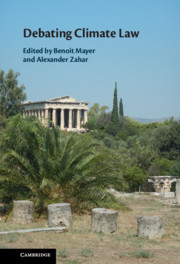Book contents
- Debating Climate Law
- Debating Climate Law
- Copyright page
- Contents
- Contributors
- Acknowledgements
- Abbreviations
- Introduction
- Debate 1: Customary Law
- Debate 2: The ILC’s Role
- Debate 3: CBDR Principle
- Debate 4: Compliance
- Debate 5: Climate Litigation
- Debate 6: Human Rights
- ~ A ~ Human Rights Law Can Drive Climate Change Mitigation
- ~ B ~ The Absurdity of Relying on Human Rights Law to Go After Emitters
- Debate 7: Historical Responsibility
- Debate 8: Climate Migration
- Debate 9: Negative-Emission Technologies
- Debate 10: Solar Radiation Management
- Debate 11: Climate Assessment
- Reflection 1: Adaptation
- Reflection 2: Loss and Damage
- Reflection 3: Disappearing States
- Reflection 4: Climate Finance
- Reflection 5: Non-State Actors
- Reflection 6: Regime Inconsistency
- Reflection 7: Aesthetics
- Conclusion
- Index
~ A ~ - Human Rights Law Can Drive Climate Change Mitigation
from Debate 6: Human Rights
Published online by Cambridge University Press: 15 June 2021
- Debating Climate Law
- Debating Climate Law
- Copyright page
- Contents
- Contributors
- Acknowledgements
- Abbreviations
- Introduction
- Debate 1: Customary Law
- Debate 2: The ILC’s Role
- Debate 3: CBDR Principle
- Debate 4: Compliance
- Debate 5: Climate Litigation
- Debate 6: Human Rights
- ~ A ~ Human Rights Law Can Drive Climate Change Mitigation
- ~ B ~ The Absurdity of Relying on Human Rights Law to Go After Emitters
- Debate 7: Historical Responsibility
- Debate 8: Climate Migration
- Debate 9: Negative-Emission Technologies
- Debate 10: Solar Radiation Management
- Debate 11: Climate Assessment
- Reflection 1: Adaptation
- Reflection 2: Loss and Damage
- Reflection 3: Disappearing States
- Reflection 4: Climate Finance
- Reflection 5: Non-State Actors
- Reflection 6: Regime Inconsistency
- Reflection 7: Aesthetics
- Conclusion
- Index
Summary
This chapter debates the relevance of human rights law to climate law. No doubt the impacts of climate change hinder the enjoyment of many types of human right. On this ground, Nicola Pain makes the case that climate change can be viewed as a human rights problem, entailing that states must mitigate climate change in order to comply with their positive obligations to protect human rights. Fanny Thornton explores the weaknesses in this position. She counters that viewing climate change through a human-rights lens is misconceived and leads to absurd results, not least because there is no standard by which to assess the adequacy of governmental mitigation action.
Keywords
- Type
- Chapter
- Information
- Debating Climate Law , pp. 145 - 158Publisher: Cambridge University PressPrint publication year: 2021
- 1
- Cited by

